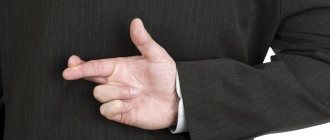One night they called me and said that I had to respond to an alarm in the store - this was part of my duties. Tired and in autopilot mode, I replied, “Sorry, I’m not home right now.” At the other end, after a short silence, they retorted: “How do you explain the fact that we are calling you at home?”
Let us not portray blameless angels. We lie so much that none of us remember our first time. Except for especially vivid episodes, and only in cases where we got caught - successful lies are always erased from memory. Because we ourselves believed in him. In the real world it is impossible to survive without lying. If so, let's analyze how to achieve success in this matter.
Photo: Steven Ketchum
Let's start by debunking the myths presented by the film “Seventeen Moments of Spring”. No one will give us, like Stirlitz, the opportunity to spend hours laying out matchstick animals on the table in an attempt to build a plausible version of events. You need to understand that by the time you are ready to lie, you must have a plan of action and a story ready. Citizens from the movie Gestapo could afford to indulge in nagging and marinate the spy so that he had time to create an alibi for himself. All they had at stake was the fate of the Reich, but you are risking your career, family peace or your mother’s health.
Develop a legend in advance
Amateurism and negligence are the key to immediate failure. It's easy to lie to children under five. Their RAM will still erase everything completely, and the next day you will get a clean version, fresh from the press. But if you are going to lie to an adult, then do not deny him the ability to critically analyze. Your version of events should be logical and follow from your usual lifestyle and daily routine. If you have never suffered from a love of painting, no one will believe that you cried for two hours before Pukirev’s “Unequal Marriage.”
Why are we lying?
Lying in such cases not only makes life more pleasant, but generally possible. It is difficult to even imagine what human relationships would look like if they were based on pure truth. Friendship, marriage, close relationships between people would be impossible if they were not based on some kind of pretense, on a game in which one of the rules is a conscious lie.
Man differs from animals in that he can speak. And if he speaks, then, accordingly, he lies. If you teach a chimpanzee to pronounce several hundred words, it will still never be able to use them to lie. After all, she has no imagination, a purely human trait that not only allows her to foresee the worst and invent inventions, but also suggests falsifications, deceptions, and forgeries. A person can easily deceive an animal by throwing, for example, a fake bone to a dog. A dog will never stoop to wagging its tail in front of someone it doesn’t love or doesn’t trust. Therefore, animals are probably more honest than humans. But whether they are smarter is another question.
Involve a minimum of third parties
Turning lies into a continuation of “Warrior and Peace” is extremely dangerous. If you have a dubious reputation behind you and your version will be checked, take precautions. First, clearly discuss the course of events with your accomplices. Do you already have convincing details ready? Describe them in detail to your accomplices.
Ideally, the number of witnesses should approach zero. A loyal friend or girlfriend with sufficient IQ, able to remember the date, time and place and present the facts in the correct order. The more people you involve in your plan, the greater the likelihood of failure. Someone will be drunk at the time of interrogation, someone will be driving - and all hell breaks loose.
Women show much more courage and inspiration when it comes to complex designs. I know a girl who involved dozens of people in a system of lying to her husband: she managed to fly to different cities, once even paying for a ticket with her husband’s card. Someone would take her from home “to the bathhouse,” for which she always had a backpack ready: a towel and washcloth on top, shoes and an evening dress underneath, they would come for her, taking their own child for convincing, or her husband himself would take her to friend, but all her routes invariably ended in someone else’s bed. Two years. In the end, of course, there was a divorce, but the network was never revealed.
When people start lying
The famous Swiss psychologist Jean Piaget believed that children under seven years of age are not capable of lying, since in their minds the boundary between the world of reality and the world of fantasy is almost erased. They do not always know how to distinguish fact from dream. And even if a child tells an obvious lie, he does it unconsciously rather than wanting to insidiously deceive.
However, modern psychologists have a completely different view than Piaget. In their opinion, already a four-year-old child will be able to lie in order to get out of a sticky situation or get rid of reproaches. The older the child is, the more he lies, lies with more desire, and begins to see some benefit in lying. At age 11, only 28 percent of children say they have never cheated. Children who are treated poorly at home, who have problems at school or with their peers lie almost three times more often.
Therefore, already in childhood you can be convinced that lies are a good weapon. However, handling it requires appropriate skill. American psychologist Michael Hout is confident that the first successful lie is the child’s success (no more, no less), since he thereby overcomes the dictatorial omniscience of his parents. The son or daughter becomes convinced that, finally, they have something personal, their own world, inaccessible to adults.
Lying is not a human genetic heritage. It is rooted in copying behavior patterns. Children lie because adults lie. Adults cheat because their parents did. How many times have many generations of parents asked their child to say on the phone that no one was home if they did not want to talk to an unpleasant person. After all, he participated with them in an innocent deception, feeling emotional excitement from the consciousness of the “evil” being created together. Therefore, the answers to the dramatic question “Why is my child lying?” adults should look only within themselves, taking a closer look at their behavior.
Lies are evil, but, like many other things in this world, they are inevitable evil. Often it gives a feeling of mental comfort, guarantees safety, allows you to avoid unwanted meetings, and facilitates relationships between people. Psychological studies have proven that adults are more likely to sympathize with a little liar who knows how to “suck up” or show off than with an openly honest child. The same rule prevails in the world of adults. A person who is not frank, gifted with a certain amount of intelligence, always has more friends and well-wishers than a sincere and straightforward person. The liar will say: “You wrote a wonderful article,” although he doesn’t think so at all, and hasn’t even read it to the end. And a sincere person will blurt out: “In general, I did not like what you wrote, although there were a couple of good ideas in the article.” The merit of a frank person is that he still finished reading and comprehended. But who do we like best, whom do we willingly meet, whose statements do we listen to? The Czech novelist and playwright Karel Capek wrote about sincerity: “I don’t denigrate anyone, I just say what I think.”
Control your body
Photo: thedandyliar.tumblr.com
In addition to the tongue in your mouth, you also have body language, which often behaves in a completely treacherous manner. For an inexperienced liar, this becomes a problem: in terms of expressiveness, body language is in no way inferior to verbal means and reveals red-handed behavior no worse than fingerprints. Body language is read subconsciously: it’s enough to be tense, avoid looking in the eyes, fold your hands in a protective position - and now they’re starting to drive needles under your nails. And all the damn adrenaline, which causes sweating, intermittent breathing and unnatural movements. Try to lie on the phone first - this way you won’t be seen. If you have to lie in person, do breathing exercises, calm your nerves and act: straight back, open arms, firm gaze. Just don’t try to drink to relieve tension - you’ll tell everything how it happened, and even mention that incident that’s awkward to remember.
Use distraction and switching
A true master of deception, like the Spanish matador, draws his sword only at the decisive moment and delivers only one blow. The rest of the time, he skillfully distracts the victim's attention with the help of skillful movements of his red cloak. The art of lying uses similar techniques, and sometimes skillfully switching the interlocutor’s attention to another object or changing the topic of conversation eliminates the need to lie altogether. Think over your line of behavior in advance in such a way that you don’t have to tell a lie at all. Just be careful not to overdo it, because incompetent use of a muleta can cost the matador his life!
Control your voice
Take a cue from Frank Sinatra when he sings “Strangers in the night.” I am ready to believe his every word: I swear, everything happened like that. Why? And he puts it well! However, it is easier to deceive a man than a woman. For genetic reasons, women are much more sensitive to the nuances of speech and isolate inconsistencies from what they hear. It is this ability that allows them to hear the cry of their baby amid the roar of an electric meat grinder. The highest category of complexity is wives and mothers. During the time you spent together, your speech was recorded in their memory in the form of a certain set of vibrations (don’t delude yourself that women are interested in what you weave every day). Deviations in timbre and tempo are immediately registered and raise suspicion. It’s better to lie to men, so the risk of getting caught is much less. But in all cases, follow simple rules: relax your abdominal muscles, free your breath, breathe evenly. Laugh in the right places, there is nothing more useful for distracting attention than laughter.
Believe in everything yourself
The universal and invincible way to lie is to believe yourself that it was so. This is a major league Oscar nomination for Lies. However, only true artists are capable of this. The inspired chatter of these citizens will find a way to any heart: their eyes glow with a restrained brilliance, their voice lulls, their gestures inspire confidence, and now Konstantin Sergeevich wipes away an old tear, saying: “Darling, I believe you.” This requires time and preparation. Rehearse your part in front of the mirror, looking deep into your soul, memorize it from beginning to end and back again, until your legend begins to appear in your dreams.
Who among us doesn't lie?
Everyone knows the fairy tale about Pinocchio: when he told a lie, his nose became longer. If, after each deception, a person’s nose lengthened by at least one tenth of a millimeter, then by the end of life, instead of a respiratory organ, people would wear huge trunks.
Lying is considered a terrible flaw. One famous American sociologist says that lies are a dark dream, while the truth is reality. However, we all know very well that reality often takes on the semblance of a nightmare. Sometimes public life is based on lies. All etiquette and rules of behavior in most cases are based on deception and pretense. “Come in, I’m very glad you came,” says a well-mannered man to an uninvited guest. “It’s very tasty,” a polite man praises the hostess of the house, despite the fact that he is completely fed up and generally does not like this food. “A wonderful gift,” the wife encourages her husband, although she actually thinks to herself: “Well, again, you bought me the wrong thing.”
Attack!
Photo: claytonology.weebly.com
Politicians are genetically predisposed creatures that inhabit our planet. In addition to natural hypnotic abilities, they usually also master methods of diverting attention. If you fall for a lie, use their know-how. There is no better defense than attack - remind your opponent of an episode from the past when he behaved reprehensibly. It doesn’t matter whether it has anything to do with your lying, it’s important for you to shift the blame from your head to a healthy one. Demagogy and self-confidence are the best helpers here: “How could you lie to me?” - “How could you not love my grandmother? She moved from Shchuchin just to be closer to you!” - and the conversation immediately takes a direction that is favorable to you. The best politicians immediately came up with offensive nicknames for their opponents based on physical and personal characteristics, but I do not recommend this method to you. Especially if you have to lie to your mother or wife.
Learn to tell the truth
At one time I also learned to tell the truth. This does not mean that now I am always absolutely truthful - no, anything can happen. But I strive for this. Especially in your family, even in small things. I try to be honest with children. If I’m wrong, then I admit my mistakes, and this is important, because if I don’t do this, then the children will not learn to admit theirs. I’m learning to tell the truth to other people, because - well, what can you do if everything is this way and not otherwise?
Tell the truth! This is good. Then you will begin to respect yourself. A person who tells the truth always perceives it adequately if the truth is told to him. Anyone who is used to lying has low self-esteem. Such a person does not respect himself, and in this case he cannot respect other people - everything is interconnected. Learning to tell the truth is difficult, we must be prepared that somewhere we will break, betray our souls, but we must strive for the truth. On the other hand, there is no need to flog the truth everywhere and expose everyone.
You just need to first accustom yourself to honesty - with God and yourself, and not pretend to be sinless before Him. God did not come to the righteous: “It is not the healthy who need a doctor, but the sick; I came not to call the righteous, but sinners to repentance” (Mark 2:17). The Lord cannot save those who imagine themselves to be righteous. It can be very sad to hear in confession: “I have not sinned in anything.” I would like to say: then confession and communion have no meaning for you. Why are you here if you have no sin? We are all being treated for our shortcomings, why do you come here? Healthy people have no place in the hospital - go, enjoy life: you are healthy! It is clear that this is an illusion and self-deception: there are no righteous people. Then - let's honestly deal with our sins. Let a trusted person help you with this - not necessarily a priest. This could be an authoritative friend or relative - someone who will not lie to you. The main thing is to listen to him and start working on yourself.
Recorded by Ekaterina Shcherbakova
Deny everything
Common sense, logic, even video recordings - everything gives way to the reinforced concrete word “no”. If you lie to your loved ones, the task becomes easier - they are obviously determined to forgive you.
My friend's wife once found a pack of condoms in his bag. She carefully cut each one in half and put the pack back, fastening the clasp. Since then, not one of them has mentioned the incident, but each has drawn appropriate conclusions for themselves.
People can cheat on their spouses on a schedule for years, while the other half will know where and why the first one is going every Saturday - everything, right down to the exact address. And don't make any noise. Only the most consistent of people will seek your final fiasco. If they behave this way, chances are your relationship is in a coma. You will certainly be acquitted, just be patient. The main thing is don’t even try to show weakness and start apologizing!
How to understand that a person is lying
You can identify a liar using the following parameters. The pupils of the deceiving person peer motionlessly at the object of deception, as if observing the effect of their own words. Or, on the contrary, a liar, does not know where to place his eyes, and avoids the gaze of his interlocutor. His gestures are also characteristic. Most often, the person telling a lie places his palm on his lips or touches them lightly, almost rhythmically, with two fingers. Sometimes the liar makes muffled coughing sounds. Here is how the German philosopher Arthur Schopenhauer proposed to expose a liar: “If you suspect someone of lying, you must pretend to believe him, then he will begin to lie even more shamelessly - and will be caught. If you notice that a piece of truth has escaped from him, which he would like to hide, then you need to pretend that you don’t believe in it and provoke him to open all his reserves and reveal the whole truth.” But before using all sorts of methods to discover the truth, you should first of all think about whether you want this.
Train your memory
Photo: weblyest.com
As you enter the slippery slope of being a liar, remember that you will have to keep all the details of your essays in mind. A good liar is like a chess player: in cases of multi-move combinations, he keeps all the threads under control, like a spider in a web. Only a complete idiot would take notes, it’s better to admit everything right away, the result is still the same. Laziness of mind is punished by exposure. A friend of mine had a strong passion for order; she kept all her vacation photos, both with her husband and with her lover, in the “Vacation” folder on her work computer. Convenient and no need to search. Needless to say, her husband once stopped by her office asking her to send a couple of emails?
Lying is akin to high art. It combines acting and math skills, trains mental flexibility, memory and in the long run promotes longevity of the brain. If it were not for the moral and ethical nuances, I would recommend lying in a high school course. Alas, at the moment we are left with crosswords, puzzles and macramé courses.
Why can't you tell the whole truth?
https://pixabay.com/
If everything is complicated with the moral and ethical aspect, then with the practical plane everything is much simpler. What is the truth? There is no clear answer. It can be, for example, partial, or not voiced, or not fully voiced. Quite often, the answer received depends on how exactly the question was formulated.
That is, if you have high intelligence, knowledge of psychology and rhetoric, you can avoid a direct answer and not go straight to lying. There are conditionally four situations in which you can give out truthful information incompletely in order to achieve a certain result:
The need to obtain a certain answer from the interlocutor. For example, you are chatting with a friend. You don't expect objectivity from him. You need support, you need him to take your side. And you tell the “correct” version of the event.
The need to spare other people's feelings. Let’s say (God forbid, of course), the eldest son tells his mother about the trauma that happened to the youngest. Of course, he will keep silent about all the terrible details. It seemed that the arm was twisted at an unnatural angle, blood was gushing in all directions, it seemed that the bone was visible. Why injure, frighten and irritate mom? It will only be announced that there was an injury, everything is fine, the doctor helped.
Reputation protection. Sometimes we are forced to significantly exaggerate our strengths and significantly hide our shortcomings. It’s impossible to even imagine that a person who came to an interview would tell the truth: I don’t want to work, I really want money, I’m lazy and not very competent, in fact. It is clear that the applicant will eloquently promise something that he does not intend to fulfill, and describe qualities that he does not possess. Maybe it'll take a ride.
Self-defense. Many people really don’t like scandals, showdowns, showdowns. Therefore, they would rather lie and go into the shadows, for example, feign indifference to the issue under discussion, rather than cause open confrontation. Sometimes this really helps to protect not only your interests, but also your health - by deciding not to waste energy, nerves, time on a useless and unnecessary fight.











